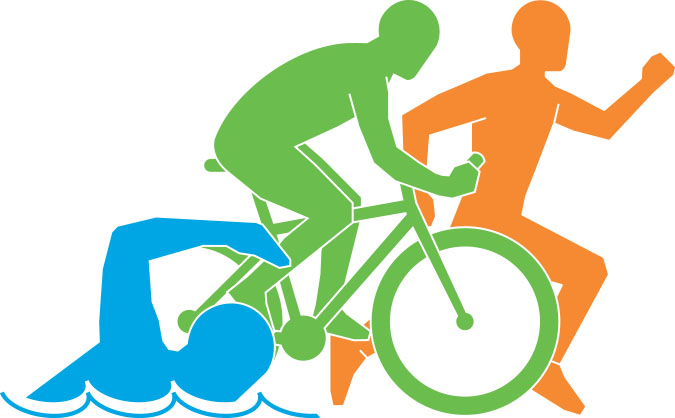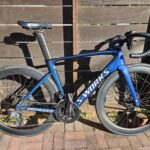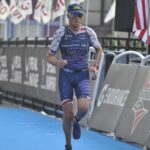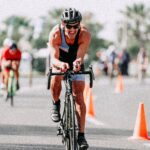As every triathlete has experienced, it’s been a challenge to find races during this Covid-impacted season no matter where you live. I was able to get in a sprint race in early March before the pandemic struck and have been scouring the online triathlon calendars ever since. Each month, there were signs of hope for upcoming races, but, inevitably, I would receive an email with the words “canceled” or “postponed till 2021” in the Subject line (such pain, torture, and agony!).
Thanks to the intrepid efforts of a race organizer in Central California and some very forgiving county officials, I was able to get two more races in before, as we near November, there appear to be no more races in sight in my neck of the woods. I wrote about the challenges I faced in my first covid-era race in an earlier article.
My final race was moved from the mountains in the Eastern Sierras to the farmland of Bakersfield, California, because of the lingering effects of the devastating wildfires that swept through the area earlier this fall. I was actually excited about the move because it meant going from an elevation of 5500’ and a bike route that included 2500’ vertical of climbing and a equally hilly run to a flat-as-a-pancake bike and run at sea level (obviously the swim was also flat!). In the weeks leading up to this change in venue, I had to shift gears (pun intended) from doing a lot of vertical on my road bike (an S-Works Venge, if you were wondering) and hill repeats running back to flatter terrain on my tri-bike (a Diamondback Andean, if you’re curious) and on the running track.
Unlike my last article, I’m not going to dissect my race experience. Instead, I’m going to extol the virtues of mental training and how it enabled me to have a really successful last Olympic-distance race of the season.
You might not think that preaching the value of mental training is such a stretch for me (in addition to being pretty self-serving) given what I do for a living. But I’m not going to approach this from a professional perspective. Rather, I’m going to describe several mental tools that I used before, during, and after the race that enabled me to have a great race and that you can use on race day yourself. Plus, I feel pressure to “walk the walk” as a triathlete rather than just talking the talk as a mental coach. It wouldn’t look very good for someone in my line of work to have a mental meltdown at a race now would it?!?!
Mental Imagery
Mental imagery may be the most powerful mental tool you can use to prepare for a triathlon. It involves closing your eyes and see and feeling yourself racing the way you want on race day. Of course, I didn’t imagine myself racing entire upcoming triathlon from start to finish (that would take far too long!). Instead, in the week leading up to the race, I would take five minutes and imagine myself racing key parts of the course (I didn’t know the venue, so I just made up segments based on what I knew of the course descriptions and profiles). Here are the scenarios I imagined myself in:
- Before the start being relaxed and positive (and smiling a lot!).
- Swim.
- The start of the swim, settling into a steady and comfortable pace.
- Around the first buoy with a focus on staying positive, maintaining my form and stroke count, and keeping my body relaxed.
- During the last 100 yards reminding myself to keep pushing and finish strong, and shifting my focus to a fast T2.
- T1.
- Relaxing my body and catching my breath from the swim exit to the transition area.
- Performing my precise transition routine.
- Bike.
- Fueling up at the beginning of the ride and establishing a pre-determined pace.
- Seeing and feeling myself push hard and maintaining a relaxed body through the middle of the race.
- Approaching T2, reminding myself to keep pushing and finish strong, and shifting my focus to a fast T2.
- T2.
- Relaxing my body and catching my breath from the bike dismount line to the transition area.
- Performing my precise transition routine.
- Run.
- The feeling of my legs adjusting to running and settling into a pre-determined pace.
- Staying relaxed and maintaining my stride and pace through the middle of the run.
- Staying positive and continuing to push through the pain.
- A strong and aggressive finish.
- After crossing the finish line.
- Smiling and experiencing the excitement and pride of a great race.
Breathing
Breathing may be the most under-rated tool in a triathlete’s toolbox. Breathing can have an immense impact on us psychologically, emotionally, and physically before and during a race. It can also help to mitigate the inevitable pain we all feel when racing. As a race progresses, we begin to lose control of our body as it goes into survival mode to protect from the pain. As the discomfort ratchets up, the one aspect of our physiology we can control is our breathing.
Here are several places in my race in which breathing was my central focus:
- As part of my pre-race routine in which I was constantly taking deep breaths.
- For both stroke rhythm and body relaxation during the middle stage of the swim.
- To lessen the pain in the last 200 yards of the swim.
- Deep and controlled breathing during the run from the swim exit to T1.
- To settle my body and establish a pedaling rhythm in the first mile of the bike.
- Focusing on my breathing to relax during the middle of the bike.
- Deep and more intense breathing to overcome the pain and maintain pace through the final few miles of the bike when I was hurting.
- To settle my body into a comfortable pace early in the run.
- To distract from the rising level of discomfort I was feeling at the turnaround of the 10K.
- Extreme focus on my breathing in the last two miles as my body was rebelling against the pace and in the final sprint to the finish.
Self-talk
Self-talk is an absolute dealmaker or dealbreaker in triathlon. Whether your self-talk is positive or negative will determine whether you stay your own best ally that drives you to a great race experience or you become your own worst enemy which will certainly result in a unfulfilling race experience.
Here is some negative self-talk that has taken over my mind in previous races:
- Before the race.
- “Why do I put myself through this?”
- “I’m not feeling very good today.”
- “Am I ready for this?”
- “Everyone else looks so fit and ready.”
- During the race.
- “What am I doing out here?”
- “This hurts so bad.”
- “I wish this was over.”
- After the race.
- “Was that really worth it?”
- “I’m never doing that again.”
- “That sucked!”
I can assure you that such self-talk dooms you to a less-than-satisfying effort and a disappointing performance.
Here is some positive self-talk that I used in my race that enabled me to have a race that I felt really good about:
- Before the race.
- “You’re as prepared as you can be for this race.”
- “This race is why you’ve been training for so many months.”
- “This is going to be hard, but fun.”
- During the race.
- “Keep pushing.”
- “This is why I do triathlons” (when it starts to get hard).
- “Dig deep and finish strong” (at the end of each leg of the race).
- After the race.
- “Great effort!”
- “I left it all out on the course.”
- “I’m so proud of myself!”
So there you have it; some really practical mental tools you can use in your training and especially on race day to get the most out of your efforts.
BTW, I just realized something. It’s only about four months till the start of the 2021 triathlon season. I better get cracking (as my UK friends say) on my training!
Do you want to take the next step in training your mind to perform your best in training and on race day? Here are four options for you:
- Read my latest mental training book: Train Your Mind for Athletic Success: Mental Preparation to Achieve Your Triathlons Goals.
- Listen to my Train Your Mind for Athletic Success podcast.
- Take a look at myonline mental training courses.
- Schedule a 1:1 session with me.







